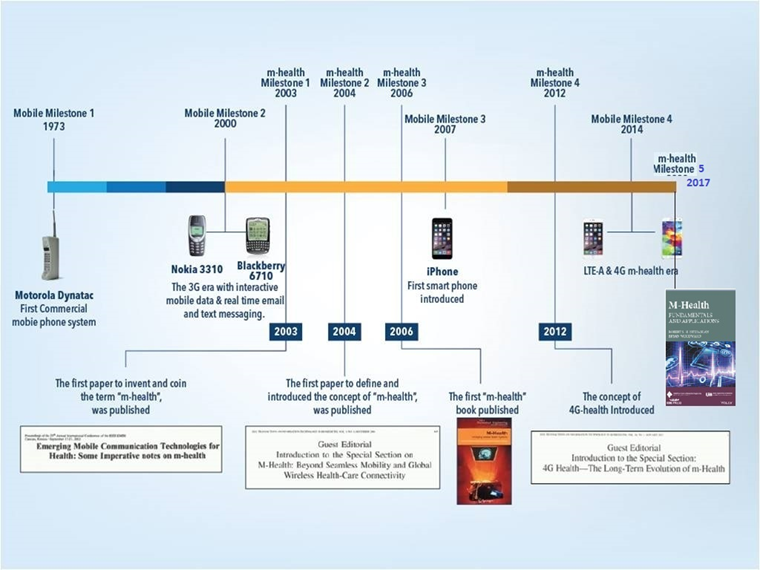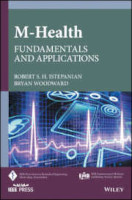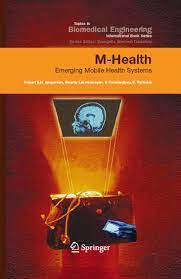For more than two decades, mobile health or (m-Health) was hailed as the most innovative and enabling area for the digital transformation of healthcare globally. The scientific and technological pillars that were formulated and embedded in the first definition of mobile health: ‘mobile computing, medical sensor and communications technologies for healthcare’, are vital to understand this important area scientifically and clinically. This definition remains the acceptable notion and the cornerstone in understanding of mobile health. These pillars are also underpinned by the scientific and technological principles of computing, communications and sensing technologies as applied for healthcare that encapsulate these basics. For more than a decade, numerous m-Health systems and applications that are centred on the smart phone applications domain, were applied successfully to a large volume of clinical and evidence-based studies conducted globally. These resulted in major global m-Health markets, businesses and investments estimated in their Billions of US dollars annually. The smart phone based m-Health applications are at the core of global m-Health markets and delivery system. These are applied successfully in numerous monitoring, management, diagnostics, prevention wellbeing and many other areas. More recently mobile health is being increasingly included within the relatively new ‘digital health’ term. However, such inclusion remains debatable and require further scientific debate and rigorous studies on the validity and correctness of such conjecture.

The evolution and key milestones of mobile health (2003–2021). (Adapted with permission from Istepanian, R.S.H.; Woodard, B. M-Health: Fundamentals and Applications;2017 Hoboken, NJ, U.S.A.: John Wiley & Sons).
Encomiums

‘m-Health: Fundamentals and Applications is a wonderfully comprehensive introduction to the subject of m-Health with valuable examples of studies and successful applications of this rapidly emerging innovation in healthcare. It highlights the crucial work that needs doing if we are to close the gap between what we know—in terms of the clinical evidence supporting m-Health innovation—and the challenges of consumer acceptability that may prevent wider adoption and diffusion of this exciting technological platform’.
Professor the Lord Ara Darzi of Denham OM KBE PC FRS, Director, Institute of Global Health Innovation, Imperial College London[Extract from the forward of the book: m-Health: Fundamentals and Applications, Istepanian, R.S. H. and Woodard, B., John Wiley- IEEE, 2017]

The term "mHealth" or "mobile health" was first coined by Dr. Robert Istepanian in 2003. Dr. Istepanian, a professor of mobile communications and telemedicine at Imperial College London, used the term to describe the convergence of mobile communication technologies and healthcare. He recognized the potential of mobile devices and wireless technologies to transform healthcare delivery and improve access to health services. Dr. Istepanian's work laid the foundation for the field of mHealth and its subsequent development.
Chat GPT Open AI (Q: Who first coined the term mhealth or mobile health?)
‘Welcome to the world of mHealth! The term mHealth was first coined by Robert Istepanian to describe “emerging mobile communications and network technologies for healthcare’.
Steven Tucker, Editor-in-Chief, mHealth[Extract from the first issue of m-health journal: https://www.ncbi.nlm.nih.gov/pmc/articles/PMC5344173/; 2015].

-
‘More than a decade ago, my Imperial College colleague Robert Istepanian coined the term mHealth to represent mobile health sensing and advice. Today, affective computing can enhance mHealth by, for example, encouraging mHealth technology adherence through emotionally intelligent device interactions, such as engagement monitoring’.1
Professor Bjoern Schuller, Imperial College, London[Extract from: ‘Can Affective Computing Save Lives? Meet Mobile Health’, IEEE Computer, May 2017]
-
‘More than 20 years ago, Dr. Robert Istepanian, a data communications professor at Kingston University in London, coined and defined the term mHealth’
Professor Donna Malvey, University of Central Florida & Professor Donna J. Slovensky, University of Alabama, Birmingham[Extract from the book’ mHealth: Transforming Healthcare’, D. Mulvey and D. Slovensky, Springer, pp. 187, 2014]
-
‘Mobile health (mHealth) emerged in 2003; Robert Istepanian coined the term to describe the use of emerging mobile communications and network technologies for health care’.
[Extract from: Pan J, Dong H, Bryan-Kinns N, Perception and Initial Adoption of Mobile Health Services of Older Adults in London: Mixed Methods Investigation, JMIR Aging 2021;4(4):e30420].
-
‘The term mHealth was coined by Professor Robert Istepanian, who described it broadly as the use of ‘emerging mobile communications and network technologies for healthcare’.
Temitope Folaranmi, Blavatnik School of government, University of OxfordCentre for Disease Control and Prevention, USA[Extract from: mHealth in Africa: challenges and opportunities, Voices, 30 January 2014]
https://www.bsg.ox.ac.uk/blog/mhealth-africa-challenges-and-opportunities
-
‘Scientist and professor Robert Istepanian is credited with having coined and defined the concept of "mHealth" (i.e., mobile health) in 2003. Just eight years later, in her speech at the mHealth Summit, Kathleen Sebelius, U.S. Health and Human Services secretary at the time, said, "When we talk about mobile health, we are talking about taking the biggest technology breakthrough of our time’.
Richard Resnick, CEO Cureatr[Extract from: What is mHealth and How Can It Improve Patient Care? Creatr blog, August 27, 2019]
https://blog.cureatr.com/what-is-mhealth-how-can-it-improve-patient-care
-
‘The term mHealth was coined in 2006 by Robert Istepanian to describe “emerging mobile communications and network technologies for healthcare’.
Almost two decades later, the mobile healthcare industry is getting ready for a wave of big changes. There are all kinds of signs:
- Apple and Samsung have introduced a wide array of innovative mHealth features
- Blockchain technology advances
- Quantified Self movement and abundance of fitness & wellness mobile apps
Matthew Carrington, Velvetech[Extract from: Incentive-Driven mHealth Solutions Setting Trends in 2023, Velvetech blog, November 11, 2022]
-
‘Technology in the healthcare industry has advanced at a rapid rate since scientist, scholar and pioneer Robert Istepanian first introduced the concept of mHealth (mobile health) almost two decades ago’.
Kirsty Rigg - Health Tech World[Extract from: What mHealth really means in a modern clinical setting, October 26, 2022]
https://www.htworld.co.uk/news/what-mhealth-really-means-in-a-modern-clinical-setting/
-
‘Mhealth is considered to be a subsegment of the larger e-health industry and was first used by Robert Istepanian as the use of ‘emerging mobile communications and network technologies for healthcare’.
Renuka Shahane, Scalefusion[Extract from The rise in mHealth- How mHealth is redefining healthcare, Scalefusion blog, June 18, 2020]
https://blog.scalefusion.com/how-mhealth-is-redefining-healthcare/
-
‘In 2003 the term ‘mHealth’ was first coined by Professor Robert Istepanian of London’s Kingston University and defined as ‘emerging mobile communications and network technologies for healthcare. The term since then evolved massively and is widely used today and, as technologies evolve’.
Rebecca Aris, Roche Diabetes Care and Managing Editor of Pharmaphorum
[Extract from Pharmaphorum Interview with Robert Istepanian, 23 September 2012].

M-Health: Emerging Mobile Health Systems presents recent advances in this area and explores future trend and applications of current and emerging wireless communication and network technologies for healthcare delivery and new wireless telemedicine services.
Springer Link
[Extract from the book : ‘M-Health: Emerging Mobile Health Systems’, Istepanian, R S H, S. Laxminarayan, and C. Pattichis (Eds.), Springer-Verlag, London, 2006]

